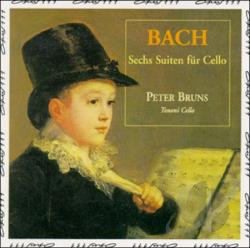
Peter Bruns. Bach Cello Suites Opus 111 OPS 30-176/77. Released 1997. Re release 2003 on Naïve-OP 20010 (titled six evolutions 15 years before Yo Y o Ma release!) Auditioned on Presto streaming 16bit/44.1kHz.
Recorded in Paris May 1996
Cello played by Carlo Tononi, of Venice 1730. This is a cello that Pablo Casals previously played.
The cellist.
Bruns is German born and appears to have stayed relatively close to home throughout his career. He studied with Peter Vogler in Berlin. He has been professor for Cello in both Dresden and Leipzig schools of music. His biography is keen to stress his international performing credentials, but I suspect without giving the game away that Bruns is a performer who is more concerned about his music than a glittering international career.
The recording.
This recording is ideal in the sense that nothing about the sound quality, ambience or presence hits me as requiring comment. I would suggest this is as it should be!
The music.
For me, this is a very engaging performance. The are lots of dynamics, variation of tone and voicing. The phrasing is very detailed and impresses with the care it is presented to the listener. There is an impression of space between phrases but the music flows well giving a constant sense of momentum. There is not a lot of rubato (variation in timing) but the playing is certainly not metronomic. The tone varies from strong and firm to gentle and light according to the movement and within movements This is often done very effectively by following a loud passage with a significant quieter phrase, emphasising the contrast. The fifth Prelude is a good example. I found myself drawn right into the music by this performer; almost mesmerising!
The style of playing is what I would term modern hybrid. I assume a modern set up but lack of obvious vibrato and with excellent articulation. The cello sound for the most part is allowed to resonate naturally and free from too much forced emphasis.
More detail.
Speeds are on the faster side particularly the Courantes and Gigues but not obviously and without a sense of haste. The second Courante may be an exception coming in at 1min 49 sec! The Sarabandes are played briskly but in a very appealing light and stylish manner. The fifth Sarabande is a standout here, very moving.
The first four Suites are very good but the last two are excellent. The Preludes are strong and dynamic, the Allemandes reflective and subtle. The Courantes are lively and soar into the highest reaches of the cello very securely. The Sarabandes whilst being very complex flow well and in a relaxed manner. The Gavottes are swashbuckling in the first and reflective and quieter in the second. The Gigues particularly the sixth are played with great aplomb. I am reminded of the interpretation of the French cellist Andre Navarra. The only difference being that Bruns is far more accurate.
I realise I have not mentioned the technical side of things up to the last point, which I feel is down to the total musical commitment of this artist. The music is so engaging that the technical side seems an irrelevance!
Conclusion.
I feel this is an outstanding conventional interpretation which grows on the listener as we discover new nuances. Having auditioned on streaming I have ordered a copy from Amazon France where there seem to be available copies at reasonable price
Charles